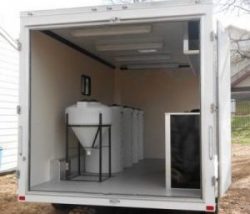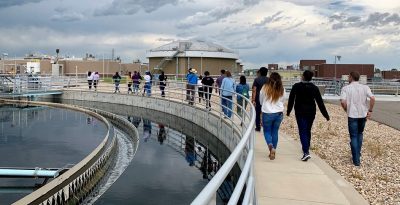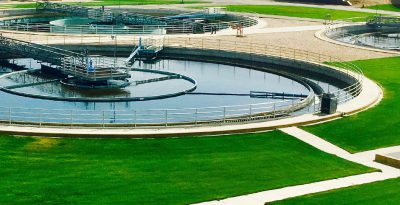
South Platte Renew (SPR) recently partnered with the Colorado School of Mines Civil and Environmental Engineering Department to pilot its Coupled Hybrid Anaerobic Reactor for the Generation of Energy.
The name is a mouthful, so the good people at Mines shortened it to CHARGE. This will be the first of several pilots implemented at SPR with kickoff set for the summer of 2019.
What is CHARGE?
 Not only is CHARGE a clever acronym, it’s also a simple, cost-effective method to remove solids and carbon from wastewater to decrease the cost of primary treatment at wastewater plants and possibly create energy.
Not only is CHARGE a clever acronym, it’s also a simple, cost-effective method to remove solids and carbon from wastewater to decrease the cost of primary treatment at wastewater plants and possibly create energy.
The original project was successful under the available conditions. Mines took the knowledge gained in the first run and compacted the unit into a trailer so CHARGE is transportable to anywhere wastewater can be treated.
Different types and strengths of wastewater and variations in flow can be tested to model real-world conditions. Eventually, CHARGE may replace standard primary treatment if enough good data comes from testing at places like SPR.
The nitty-gritty
So how does CHARGE work? It is what is known as an anaerobic baffled reactor (ABR). An ABR works by feeding wastewater by gravity into a reactor system made of several tanks.
The first tank takes in water and separates heavy solids from liquids. The water from the top of the first tank is transported to the bottom of the second through another pipe and so on and so forth until the final tank where water is discharged from the top.
The solids left in the reactors create sludge that facilitates the growth of anaerobic bacteria. The bacteria don’t need oxygen to survive. Instead, they uptake carbon and convert it to carbon dioxide and methane gases.
The carbon gas is bubbled out of the water and effectively removed from the process. Thus, the water exiting the final tank has had a severe reduction in both carbon and solids without a high energy cost.

CHARGE woks similar to this process in a mobile unit.
How the partnership works
SPR is making strides to become more sustainable and environmentally friendly. Systems like CHARGE could help that transformation occur sooner rather than later.
Mines benefits from SPR because it have the facilities to set up the 100 square foot trailer including a power hookup, wastewater, and some assistance in the monitoring department.
CHARGE pretty much runs itself once hooked up to the flow; even if power is lost it will keep on trucking. SPR also has in-house expertise on the process and will be able to give Mines beneficial feedback on possible real-world problems or exploring areas to improve.
Why does it matter?
There are ways to improve any process, even those that are tried and true. A recent focus in technology, academia, regulations, and implementation has been to allow testing of different treatment methods to improve effluent quality while recovering resources and offsetting power costs.
We are excited to enhance education for students who are passionate about the water renewal industry. This is a great opportunity to be on the ground floor of technological breakthroughs.
Want to learn more? Take a 3D Tour around the plant or schedule an in-person tour with our team.



